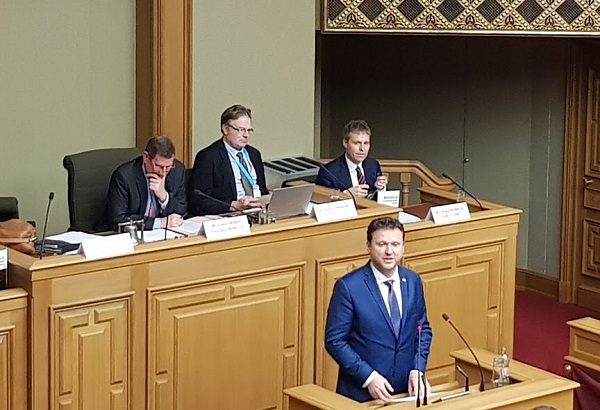 Radek Vondráček, Speaker of the Chamber of Deputies of the Czech Republic;
Credit: Jazmin Campbell
Radek Vondráček, Speaker of the Chamber of Deputies of the Czech Republic;
Credit: Jazmin Campbell
On Friday afternoon, the Speaker of the Chamber of Deputies of the Czech Republic, Radek Vondráček, addressed the Benelux Interparliamentary Assembly in the Luxembourg Chamber of Deputies.
Following an introduction by Gusty Graas, President of the Benelux Parliament and Member of the Luxembourg Chamber of Deputies, Radek Vondráček expressed his pride at being the first Czech representative to speak at a Benelux Interparliamentary Assembly. He highlighted the common European history that the Czech Republic and the Benelux countries share, as well as their position as small countries and their historic struggle for independence.
Speaking of the successes of the Benelux union, Radek Vondráček praised Benelux as an example of how different countries can maintain their individual identities whilst working together. He also applied this to the EU context, emphasising that “to have a voice, [we] need to join unions”. In this context, he recalled that the importance of regional and subsequently European consensus on many issues, as well as the importance of parliamentarism, protecting individual freedoms and upholding universal values.
During a press interview following his parliamentary address, Radek Vondráček spoke to Chronicle.lu about the current status of the EU, the challenges it faces and what he viewed as potential solutions. He began by emphasising the benefits that EU membership has brought the Czech Republic, as well as the other member states, but stated that the worst thing the EU could do now would be to stop discussing the difficulties it faces.
Concerning developments such as Brexit, Radek Vondráček expressed sadness at the UK’s decision to leave the EU but recalled that recent statistics have shown increased support for the EU in the Czech Republic, among other countries. Nevertheless, he recalled the importance of “self-reflection”, maintaining that there should be an internal discussion within the EU that attempts to see why the UK voted to leave the Union in order to avoid such developments in the future.
In spite of this, Radek Vondráček spoke favourably of the potential accession of other countries to the EU, such as Albania and North Macedonia, arguing that events such as Brexit are “no reason to stop enlargement”. He advocated the promotion of European values through this enlargement process and referred to EU membership as a potential means of preserving peace in south-eastern Europe.
Speaking about the new European Commission, Radek Vondráček proudly spoke of the role played by the Visegrád Group (composed of the Czech Republic, Hungary, Poland and Slovakia) in shaping the Commission. Nevertheless, he expressed the view that the Commission should go back to its origins as “guardian of the treaties” and become more efficient.
On climate action, Radek Vondráček maintained that the Czech Republic was fully prepared to fulfil its obligations, and indeed is already doing so, in this regard. However, he added that the discussion needs to be had at the level of the European Council rather than the Commission. He later added that whilst he believes that EU countries understand the issue and are making an effort to combat climate change, there is a need to continue discussions with other countries which are not fulfilling these obligations.
Finally, on the subject of dealing with current and future internal and external challenges, Radek Vondráček emphasised the need for the EU to pursue a more united, efficient foreign policy. In the context of raising tariffs and trade tensions at the global level, he maintained that “countries alone cannot solve this”. This unity should lead to greater efficiency, as well as clarity about what the EU represents. Concerning European security, he advocated further discussions on strengthening EU military cooperation, although he reiterated that the Czech Republic was primarily committed to NATO in this context.
The address and subsequent press meeting concluded Radek Vondráček’s three-day official visit to Luxembourg – although he added that he hoped to return, due to the warm welcome he received and the many similarities he discovered between the two countries.








